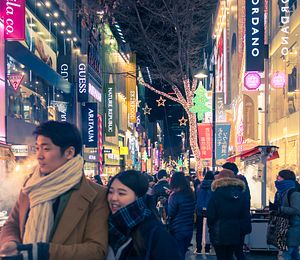Katharine Moon, senior fellow for the Center for East Asia Policy Studies at the Brookings Institution, has published a East Asia Policy Paper (Paper 6, October 2015) entitled “South Korea’s Demographic Changes and their Political Impact.” The paper addresses the political implications of the population growth of foreigners and naturalized citizens, including ethnic Koreans and persons not of ethnic Korean decent. For those interested in national identity, multiculturalism, and ethnicity in the specific South Korean context but also more generally, this paper will be of interest.
Recent population numbers show nothing short of a demographic transformation underway. Moon writes, “Currently, more than three out of one hundred residents in Korea hail from foreign countries, a spectacular change from 1990, when less than 50,000 foreigners, comprising 0.1 percent of the nation’s population, lived in Korea.” Projections underscore the transformation currently taking place. “By 2020, [foreigners] are expected to constitute about five percent of the total population and 10 percent by 2030, a level comparable to the proportion of immigrants and multi-ethnic populations in some Europeans societies today.” (emphasis added)
Those not of Korean lineage include migrant workers and marriage migrants. According to numbers cited by Moon, migrant workers total more than 500,000, including about 65,000 undocumented workers, and marriage migrants (predominantly female) number around 300,000.
Ethnic Koreans include mainly Chinese-Koreans (more than 450,000) and to a much lesser extent North Korean defectors (approx. 28,000). While most Chinese-Koreans are migrant workers on a temporary sojourn, North Koreans are granted citizenship upon arrival, as per the constitution, and, save for a handful of extraordinary cases of re-defection, all stay in South Korea for good. In the event of national reunification, which would presumably mean a precipitous increase in the number of South Korean citizens (by about 25 million), there would arise an interesting and challenging “problem.”
In the section on political implications for inter-Korean relations, Moon makes the following observation:
Any process of peninsular unification must be based on the fact that South Korea is now a multi-ethnic and multi-national society whose democracy must expand and protect equal citizenship and human rights for all New Koreans. Yet such a premise would face opposition from North Koreans, given the decades-long extreme ethnonationalism and xenophobia officially propagated by Pyongyang. It is conceivable that race-based conflicts might poison the inherently complicated contestation over power and resources that any unification process would entail.
The transformative effects demographic changes are having in South Korea are completely absent in North Korea; transnational laborers and foreign brides are not migrating to North Korea. Further, there is a significant difference with regards to the type of nationalism propagated in each country. Ethnic nationalism is present in both North and South Korea, but seems to be waning significantly in the South.
The volume Multicultural Korea?, edited by John Lie, makes clear that, while the recognition of South Korea as an ethnically heterogeneous society would have been unthinkable a generation ago, there is no denying it now. Both government and civil society have recognized (in discourse and in policy) that the face of Korea has changed. Additionally, the protest energy from the 1980s minjung movement, a counter-state ethnic nationalist movement, seems to have carried over into NGO and activist work in the migrant laborer and migrant bride space, thus effecting new top-down and bottom-up discourses of national inclusiveness.
On the contrary, those in North Korea are still subject to the reactive, race-based nationalism propagated by the state since its national foundation. Indeed, the North Korean state bases its claim to political legitimacy vis-à-vis the more prosperous South on the ethnic purity of the North Korean nation – a multiethnic North Korea would, the logic goes, sound the state’s death knell.
Thus, in theory at least, the ethno-nationalism of North Korea presents a problem for inclusive, democratic politics in a unified Korea defined, in some not inconsiderable extent, by the multi-ethnic and multi-national society that it has become.
When or even if reunification occurs is more or less unknowable. But the problem of integrating “New Koreans” of Korean ethnic decent (who may cling strongly to an ethnic national identity) into a South Korean national community where national identity is increasingly becoming de-linked from ethnicity is a major issue that civil society and government will be required to deal with in a more comprehensive manner than they are with the current number of ethnic Korean citizens hailing from outside South Korea.

































